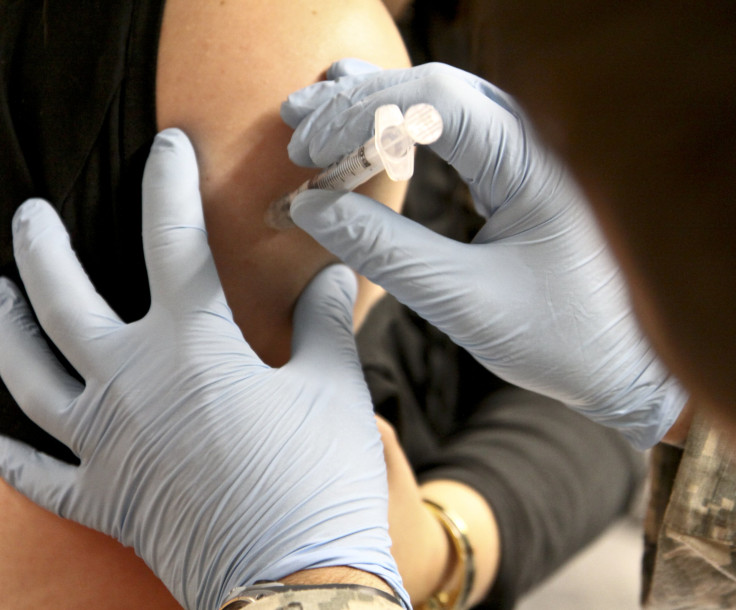Vaccine Could Lower LDL Cholesterol Levels And Prevent Clogged Arteries: A Better And Cheaper Cholesterol-Lowering Option

High cholesterol affects millions of Americans and puts them at risk for heart disease, the leading cause of death in the United States. So, imagine if a vaccine could wipe the life-threatening clumps of cholesterol from artery walls or prevent plaque buildup from happening at all? A collaborative effort from researchers at the National Institutes of Health and the University of Mexico has led to successful trials with a cholesterol-lowering vaccine. The study, published in the journal Vaccine, provides a seemingly cheaper and more effective way to treat America’s high cholesterol levels.
Cholesterol 101
Cholesterol is a type of fat found in the blood. The liver produces cholesterol, but foods such as meat, eggs, butter, cheese, and milk can provide the body with additional cholesterol, which is why diet plays a key role in a person’s health. Humans need a certain level of cholesterol to produce hormones, build cell walls, and help organs grow and function among other critical bodily functions. But too much can clog the arteries, which are essentially pathways to and from the heart transport blood throughout the rest of the body.
According to the Centers for Disease Control and Prevention, an estimated 71 million American adults have high low-density lipoprotein (LDL), otherwise known as bad cholesterol. It’s the kind that creates plaque, which can build up and clog arteries over time. High-density lipoprotein (HDL), on the other hand, is dubbed the good cholesterol because it removes bad cholesterol from blood vessels and carries it back to the liver, where it’s processed and sent back out into the body.
Less than half of adults who have high LDL cholesterol get treatment, making millions of people at risk for having a heart attack, needing bypass surgery, or dying of heart disease. People who have high cholesterol double their risk of having heart disease compared to those with lower, normal levels of cholesterol.
Creating A Cholesterol Vaccine
For the study, researchers identified a protein called “PCSK9,” which is responsible for controlling cholesterol levels in the blood. Knowing that people who have a mutation in the PCSK9 protein often suffer from an increased risk of heart disease and those who don’t produce the protein at all have a decreased risk, researchers decided to isolate and target that protein. To test their theory, researchers first injected mice with the vaccine, which stopped protein PCSK9 from working and inevitably lowered the amount of cholesterol in the blood. Next, they repeated the study with a small group of monkeys and saw a dramatic decrease in cholesterol.
Drug companies are already developing cholesterol drugs that target PCSK9, and although results have been positive, treatment can cost about $10,000 each year. The vaccine works with the same target, but a different formula, which has proven to be both more effective and a fraction of the cost. The vaccine has the potential to prevent bad cholesterol levels from reaching levels of medical concern, improving the future of health for millions of Americans. But the vaccine needs to be tested in clinical trials with human patients before the true benefits and possible side effects can be determined.
Until then, exercise, eating a healthy diet, and not smoking can also help prevent high, unwanted levels of cholesterol in the first place. Incorporating healthier habits also decreases already high levels of cholesterol. However, if natural treatment approaches fail, doctors turn to statins to help keep their patients’ cholesterol levels under control. Statins are a type of medication that work by blocking a substance your body needs to make cholesterol and can also help the liver reabsorb cholesterol that’s built up as plaque on artery walls.
Statins have long been the reliable go-to for patients with high cholesterol, but come with potentially serious side effects like muscle pain, an increased risk of diabetes, and cognitive loss. This newly developed vaccine may antiquate the use of statins as a standard of care, according to the study’s co-author Dr. Bryce Chackerian, a medical researcher from the University of New Mexico, who said the exciting part is the vaccine is already more effective than statins alone.
"Statins are still the most commonly prescribed medication for cholesterol," said the study’ co-author Dr. Alan Remaley, a researcher from the study from the NIH’s National Heart, Lung and Blood Institute, in a press release. "Although they are effective in many people, they do have side effects and don't work for everyone. The results of our vaccine were very striking, and suggest it could be a powerful new treatment for high cholesterol."
Source: Chackerian B, Crossey E, Remaley AT, et al. A cholesterol-lowering VLP vaccine that targets PCSK9. Vaccine. 2015.
Published by Medicaldaily.com



























